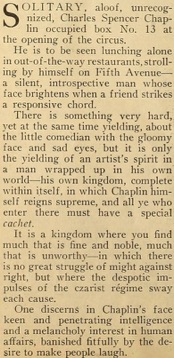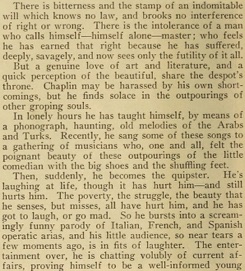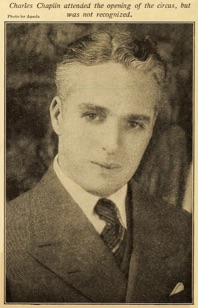The Circus 1927 1928 1929 next previous
The Circus Clippings 141/376
Aileen St. John-Brenon, Picture-Play, New York, July 1927.
Charles Chaplin attended the opening of the circus,
but was not recognized.
(...) Photo by Apeda, Picture-Play, July 1927
„...“
Editorial content. „Manhattan Medley
Intimate glimpses of movie folk sojourning in New York, with
all the news of their professional and social activities.
By Aileen St. John-Brenon“ (...)
„SOLITARY, aloof, unrecognized, Charles Spencer Chaplin
occupied box No. 13 at the opening of the circus.
He is to be seen lunching alone in out-of-the-way restaurants,
strolling by himself on Fifth Avenue – a silent, introspective
man whose face brightens when a friend strikes a responsive
chord.
There is something very hard, yet at the same time
yielding, about the little comedian with the gloomy face and
sad eyes, but it is only the yielding of an artist‘s spirit
in a man wrapped up in his own world – his own kingdom,
complete within itself, in which Chaplin himself reigns
supreme, and all ye who enter there must have a special
cachet.
It is a kingdom where you find much that is fine and noble,
much that is unworthy in which there is no great struggle
of might against right, but where the despotic impulses of the
czarist régime sway each cause.
One discerns in Chaplin‘s face keen and penetrating
intelligence and a melancholy interest in human
affairs, banished fitfully by the desire to make people laugh.
There is bitterness and the stamp of an indomitable
will which knows no law, and brooks no interference of right
or wrong. There is the intolerance of a man who calls
himself – himself alone – master; who feels he has earned
that right because he has suffered, deeply, savagely,
and now sees only the futility of it all.
But a genuine love of art and literature, and a quick
perception of the beautiful, share the despot‘s
throne. Chaplin may be harassed by his own shortcomings,
but he finds solace in the outpourings of other
groping souls.
In lonely hours he has taught himself, by means
of a phonograph, haunting, old melodies of the Arabs and
Turks. Recently, he sang some of these songs
to a gathering of musicians who, one and all, felt the little
comedian with the big shoes and the shuffling feet.
Then, suddenly, he becomes the quipster. He‘s laughing
at life, though it has hurt him – and still hurts him.
The poverty, the struggle, the beauty that he senses, but
misses, all have hurt him, and he has got to laugh,
or go mad. So he bursts into a screamingly funny parody
of Italian, French, and Spanish operatic arias, and
his little audience, so near tears a few moments ago, is in fits
of laughter. The entertainment over, he is chatting
volubly of current affairs, proving himself to be a well-informed
young man on all the topics of the day. And then again
that silence, that veil of introspective melancholy descends
upon him, and quietly he gets his little cane and,
leaving the merry throng behind him, slips into the night.“
Redaktioneller Inhalt
The Circus 1927 1928 1929 next previous






